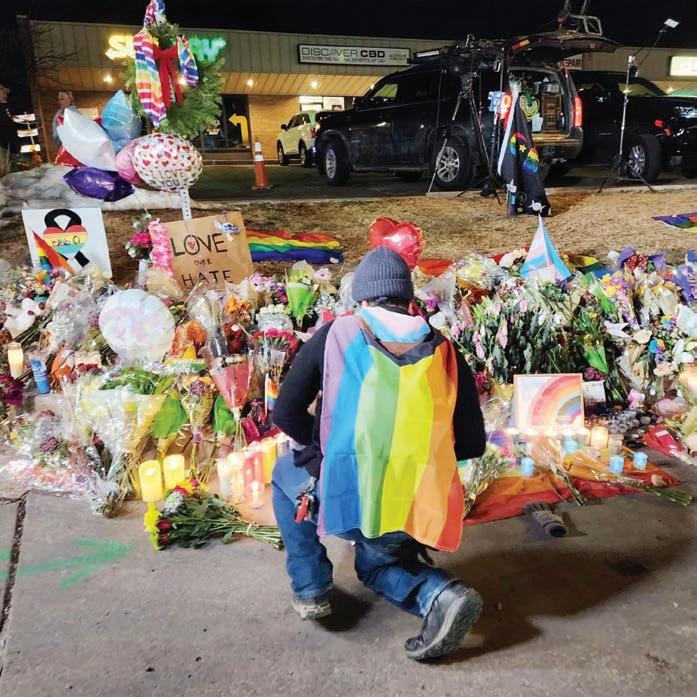
4 minute read
Rep. Crow, LGBTQ+ advocates reflect on need for change
Training, resources run short
BY TAYLER SHAW TSHAW@COLORADOCOMMUNITYMEDIA.COM
Two months after the Colorado Springs Club Q shooting, U.S. Rep. Jason Crow sat down with 16 advocates at the Transgender Center of the Rockies in Sheridan to discuss the needs and concerns facing the LGBTQ+ community.
“I’ve walked along a certain life path that’s given me certain perspectives and lived experience, but you all have walked di erent ones and it’s important to listen to that and understand that, so I can understand what I can do better,” said Crow, who represents Colorados’ 6th Congressional District.
“I know there’s a lot more that can be done and I should be doing,” he said.
Sitting around him were representatives of various organizations that serve the LGBTQ+ community, such as the Transgender Center of the Rockies and Mile High Behavioral Healthcare, the YouthSeen nonpro t, the Matthew Shepard Foundation and the Envision:You nonpro t.
April Owen, director of Transgender Center of the Rockies, said the center was very a ected by the Club Q shooting, in which ve people were killed and at least 17 others wounded.
A program of Mile High Behavioral Healthcare, the center o ers holistic, gender-a rming resources and services to LGBTQ+ people across Colorado. Since the shooting in late November, there has been an increase in the number of people utilizing the center, Owen said.
However, the accessibility of gender-a rming care for LGBTQ+ people continues to be a challenge for many, advocates explained during the nearly hour-long conversation.
“We have an abundance of therapists in Colorado,” said Tara Jae, founder and executive director of YouthSeen and a co-founder of Black Pride Colorado. “A rming therapists? Not so much. erapists of color? Handful. And there’s a waitlist for that.”
Understanding gender-a rming care and its value
Gender-a rming care is de ned as a supportive form of healthcare that helps align a person’s outward, physical traits with their gender identity, according to the U.S. Department of Health and Human Services’ O ce of Population A airs. It could include mental health, medical and surgical services for transgender and nonbinary people.
Examples of gender-a rming care include patients not having to educate their medical provider on matters such as why they use a different name than their birth name or why they have certain pronouns, said Steven Haden, the CEO and cofounder of Envision:You, which is an advocacy and training organization for the LGBTQ+ community.
Research has found gender-afrming care improves mental health and overall wellbeing of gender diverse youth, who are more at risk for mental health issues and suicide, according to the O ce of Population A airs.
In 2022, the Trevor Project conducted a national survey of nearly 34,000 LGBTQ youth between the ages of 13 and 24. It found that 45% of LGBTQ youth in Colorado seriously considered suicide in the past year, including 52% of transgender and nonbinary youth.
“LGBTQ young people are not inherently prone to suicide risk because of their sexual orientation or gender identity, but rather placed at higher risk because of how they are mistreated and stigmatized in society,” the survey states.
Transgender and nonbinary youth in Colorado also reported higher rates of anxiety and depression, at 79% and 66% respectively.
However, 60% of LGBTQ youth in Colorado who wanted mental health care in the past year were unable to get it, according to the Trevor Project’s survey.
e top reasons for this include being afraid to talk about their mental health, fearing not being taken seriously, being unable to a ord services and not wanting to get parental permission, per the survey.
Several advocates mentioned location can be a barrier as well, explaining many people living in rural areas have di culty accessing gendera rming care.
among therapists and regulatory issues that limit therapists’ ability to serve clients.
Limited training opportunities
Owen of Transgender Center of the Rockies explained mental health professionals typically have to seek out their own training for o ering gender-a rming care.
“I think that really needs to happen in schools and training programs, graduate programs, medical schools throughout the state of Colorado, in the country,” Owen said. “Maybe it’s a little elective somewhere that you can take, but it’s not a robust part of the curriculum and it really does need to be in this day and age.”
Building on Owen’s point, Jae of YouthSeen said such training should be a part of becoming licensed.
Crow said he thinks there may be an opportunity to incorporate such training at the University of Colorado’s medical school.
“I’d be happy to go to them with this and maybe see if there’s a collaboration opportunity — say, ‘Let’s, you know, add this into the curriculum as well,’” Crow said.
Diversifying the field and regulatory challenges
According to the American Psychological Association, 84.47% of active psychologists in 2020 were White compared to 6.18% who were Hispanic, 4.24% who were Black and 3.22% who were Asian.
“We know that our workforce in Colorado isn’t diverse enough,” said Haden of Envision:You. “So, how are

In addition to his work with Envision:You, Haden said he works as a mental health therapist for a small practice that primarily serves queer clients. Last year, the practice had a year-long waitlist.
“Poor folks (and) communities of color are not getting appropriate care. And so what happens is people quickly disengage from services, so while they have greater needs, the pool of people that are best equipped to serve them is much smaller,” Haden said, explaining the higher rates of suicidality is partly because people can’t get the help they need.
Jae said something that gets in the way a lot, speci cally for therapists of color, is the Department of Regulatory Agencies (DORA), which is Colorado’s regulatory agency that manages the licensing and registration of various professions.
“ e restrictions that are starting to come down to the point where it makes it di cult for therapists to stay licensed because they are trying to protect their clients,” Jae said.
When Crow asked what needs to be changed, Jae said the whole agency needs to be reassessed.
“Speci cally around licensing, registry, supports for therapists. While I am fully supportive and understanding on the need for DORA to protect clients, there also needs to be protection for therapists that are doing the work,” Jae said.
“Protections from what?” Crow asked. “What are the therapists encountering at DORA?”







